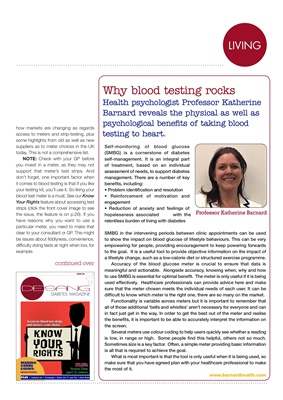
KITLIVING
continued over Why blood testing rocks
Health psychologist Professor Katherine
Barnard reveals the physical as well as
psychological benefits of taking blood
testing to heart.
Self-monitoring of blood glucose
(SMBG) is a cornerstone of diabetes
self-management. It is an integral part
of treatment, based on an individual
assessment of needs, to support diabetes
management. There are a number of key
benefits, including:
• Problem identification and resolution
• Reinforcement of motivation and
engagement
• Reduction of anxiety and feelings of
hopelessness associated with the
relentless burden of living with diabetes
SMBG in the intervening periods between clinic appointments can be used
to show the impact on blood glucose of lifestyle behaviours. This can be very
empowering for people, providing encouragement to keep powering forwards
to the goal. It is a useful tool to provide objective information on the impact of
a lifestyle change, such as a low-calorie diet or structured exercise programme.
Accuracy of the blood glucose meter is crucial to ensure that data is
meaningful and actionable. Alongside accuracy, knowing when, why and how
to use SMBG is essential for optimal benefit. The meter is only useful if it is being
used effectively. Healthcare professionals can provide advice here and make
sure that the meter chosen meets the individual needs of each user. It can be
difficult to know which meter is the right one, there are so many on the market.
Functionality is variable across meters but it is important to remember that
all of those additional 'bells and whistles' aren't necessary for everyone and can
in fact just get in the way. In order to get the best out of the meter and realise
the benefits, it is important to be able to accurately interpret the information on
the screen.
Several meters use colour coding to help users quickly see whether a reading
is low, in range or high. Some people find this helpful, others not so much.
Sometimes size is a key factor. Often, a simple meter provide basic information
is all that is required to achieve the goal.
What is most important is that the tool is only useful when it is being used, so
make sure that you have agreed plan with your healthcare professional to make
the most of it.
www.barnardhealth.com
Professor Katherine Barnard
Type 2 diabetes. The fundamental points
we make surrounding accuracy and
safety, as well as education, are equally
relevant to people with Type 1 diabetes."
www.idealdiabetes.com
Blood test meters
Here follows an overview of some
the latest global innovations showing
how markets are changing as regards
access to meters and strip-testing, plus
some highlights from old as well as new
suppliers as to meter choices in the UK
today. This is not a comprehensive list.
NOTE: Check with your GP before
you invest in a meter, as they may not
support that meter's test strips. And
don't forget, one important factor when
it comes to blood testing is that if you like
your testing kit, you'll use it. So liking your
blood test meter is a must. See our Know
Your Rights feature about accessing test
strips. If you have reasons why you want
to use a particular meter, you need to
make that clear to your consultant or GP.
This might be issues about fiddlyness,
convenience, difficulty doing tests at night
when low, etc.